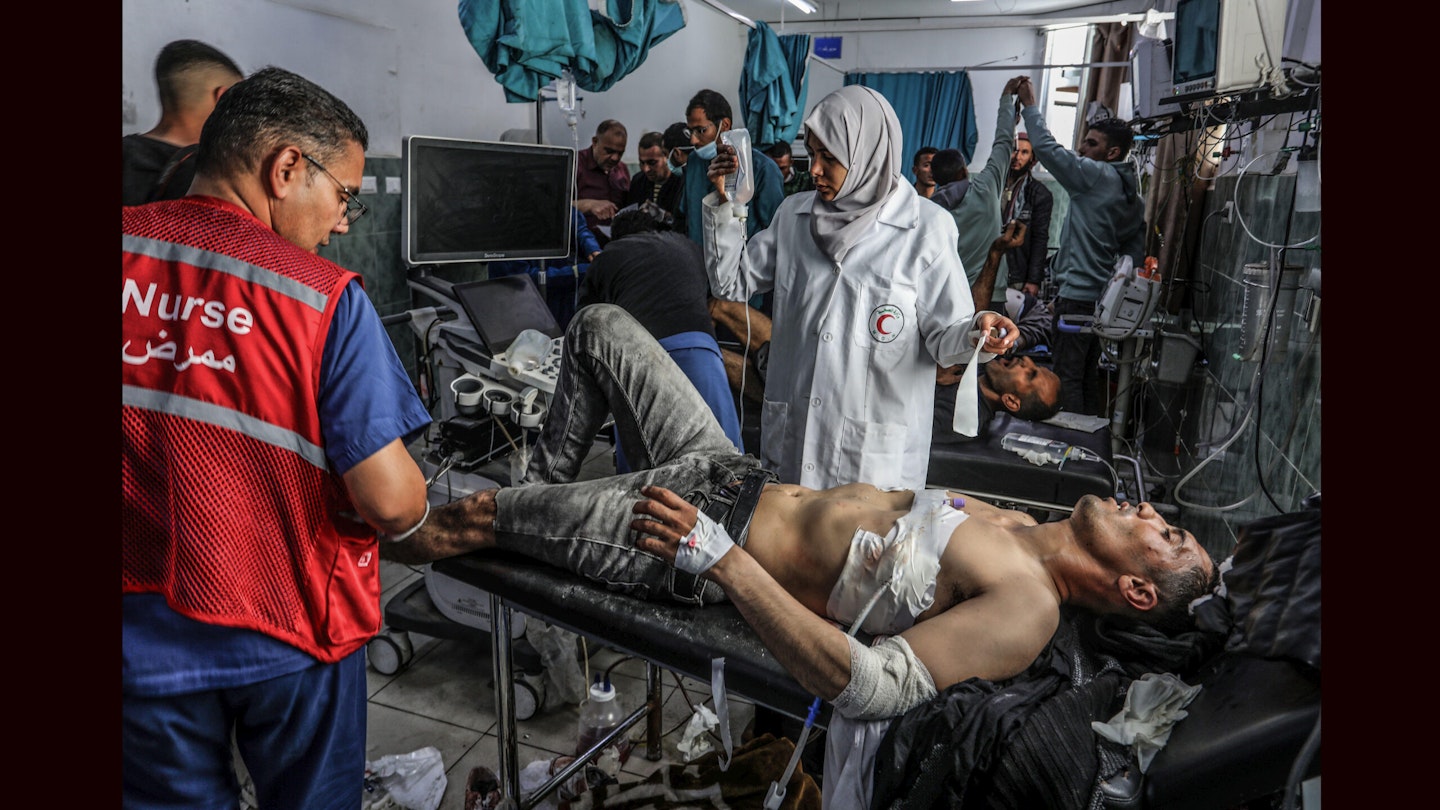The first UK-funded field hospital has been set up in Gaza by aid organisation UK-Med to deliver emergency and outpatient care. It’s based near Rafah, where 1.5 million Palestinians are taking refuge from the continued conflict between Israel and Hamas. As Grazia went to press, the Palestinian health ministry’s latest estimate is that more than 32,000 Palestinians have been killed since Israel began retaliation for Hamas killing 1,139 and taking 248 hostages in its 7 October terror attack on Israel.
The UK Government has called for an ‘immediate pause in fighting, then progress towards a sustainable ceasefire’. Earlier this month, the United Nations security council resolution called on all sides to commit to a ceasefire, but so far all negotiations are at a stalemate.
For Faye Callaghan, an NHS midwife working at the new field hospital, it is the most immediate and obvious solution to put an end to the destruction she’s seen since arriving in Gaza on 20 March.
Callaghan, who has been a midwife for 10 years, is normally based at Gloucester Royal Hospital, but decided to work in Gaza after seeing news coverage of the conflict. It’s only her second deployment with UK-Med, having worked in Libya last year after devastating floods killed more than 4,000 and displaced a further 50,000.
‘We arrived in Gaza as it got dark, via the land border with Egypt, which is a long, slow process because they’re strict on who can come in and what you can bring,’ she explains. ‘The first thing you see is that the country is pretty much destroyed, there’s a lot of people living in tents, milling around in the streets, selling things like tomatoes or beans from tiny stores because that’s all they have to try and make a living. There’s a lot of poverty, but Gaza is also on the coast, so you can see the beach and that it was a beautiful place before the war. There are bits of the tourist infrastructure, like children’s trampolines, that are now completely destroyed, but they’re still trying to play on them because there’s nowhere else to play.’
UK-Med has been working in Gaza since 3 January, sending teams to existing hospitals and setting up mobile health clinics. But according to chief executive David Wightwick, few hospitals remain viable. ‘The health system has largely collapsed, a lot of hospitals are no longer functioning at all,’ he tells Grazia. ‘The number of operating rooms that are viable is down to about 14, for a population of 1.7 million people in the south.’
So, UK-Med was forced to build its own – but it took six weeks just to get equipment across the border. Now, the hospital will provide care for both in and outpatients, plus an emergency department and pharmacy. But as the conflict rages on, there are fears they’re fighting a losing battle.
‘I’ve not seen anything quite as extreme as this in 30 years of doing this work,’ Wightwick says. ‘In terms of just the speed and scale of population movement, the lack of access to services. That means, for example, there’s one toilet between 3,000 or so people. If you’re sick or wounded in conflict, accessing healthcare is really difficult. Everything is a struggle, getting food, clean water, enough shelter. There is no education for kids. The situation is dire on every front at this point, and there’s simply not enough coming across the border to sustain that many people.’
For the maternal care department, Callaghan says the risks to pregnant and breastfeeding women are wide-ranging. ‘They could have physical trauma, because the tents or the buildings that they’re staying in could be bombed, so that will affect their pregnancy,’ she says. ‘But also now a bigger problem is malnutrition. Food is very expensive and they have very little access to it, so they can’t get the iron and vitamins that pregnant women in the UK would have. That means their babies are probably going to be smaller, and possibly not do so well at birth, and then they may struggle with breastfeeding.’
UK-Med’s care will focus on ensuring the women are gaining weight, then giving them food supplements throughout their pregnancy and while breastfeeding, plus providing an as-safe-as-possible birth. ‘Birth is hard at the best of times, never mind in a war zone where you’ve got planes flying overheard all the time and you can hear bombs in the distance; it’s just terrifying,’ Callaghan adds.
Her first patient at the new hospital was a pregnant woman who had previously gone through three failed cycles of IVF before conceiving naturally five months ago. ‘She hadn’t been able to receive any antenatal care whatsoever, she was so worried. Listening to the baby’s heart rate for the first time, she broke down in tears.’
For UK-Med, the focus is now on securing funding before the situation deteriorates further.
To give support, visit uk-med.org/gaza-crisis-appeal
